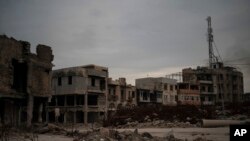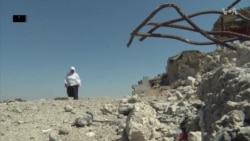Sixty-two-year-old Sabah Muhammad Ismail resides in the al-Shahwan neighborhood of Old Mosul in a little house with walls riddled by bullets from the battle between the Iraqi forces and IS militants in early 2017.
Her attachment to the house kept her from fleeing with other residents who never returned after the Iraqi victory in July 2017.
“I live here among dogs and wolves. I swear to God that dogs come gather in front of my door,” Ismail said in her house during an interview with VOA. “Despite this condition I say thank God I am at least still alive.”
Mosul is Iraq’s second-largest city with a population of more than 1 million that stayed under IS rule for three years.
Two years after the military operation, local and international organizations say large parts of the city remain damaged and residents continue to suffer from the aftermath of the conflict.
Life before IS
Before IS controlled Mosul in mid-2014, Ismail shared the house with her husband who worked as a “muezzin” — person appointed to lead and recite the call to prayer at a mosque. The surrounding houses were occupied by their relatives and close friends, turning the neighborhood into a commune of sorts where friends shared meals and tea and coffee breaks.
Ismail’s husband was killed during the IS-Iraqi forces crossfire in early 2017. In the final days of the war against IS when the Iraqi forces, supported by U.S. aerial power, intensified their campaign on IS, Ismail’s house along with the entire neighborhood were reduced to rubble.
“My heart aches when I see the neighborhood. There are no people here anymore. We are living here like wild animals.” Ismail said.
She said most of her relatives were buried under the rubble during the final battle for Mosul. Those who survived the brutal conflict and fled their homes are unwilling to return now because of the slow process of reconstruction by the government.
“This is my brother-in-law’s house, this my husband’s uncle’s house, this used to be the house of Ahmed and Najat, and this belonged to Hikmat whose children were disabled,” she said, pointing to a crumpled landscape of broken concrete and twisted metal.
Outside aid is the only hope
Many residents in Mosul express disappointment at the government’s failure to rebuild and compensate the victims, particularly those who were incapacitated by the conflict.
Iraqi officials, however, have said that recovering from damage caused by IS in the war is beyond their means and that they need more international aid to enable them to restore the nation.
Losing hope that the government could help them recover their homes anytime soon, many people have turned to charity or borrowing from their friends to rebuild their homes. Additionally, many of the city’s young people and activists have volunteered to help recover houses, clean streets, and universities to revive the city.
With some support from local donors, Ismail was able to make a few repairs to her home to make it livable. She said she is determined to spend the rest of her life in the house even if that means living in prolonged bouts of solitude.
“This is our life and situation here. I have lived in this area for 62 years; I can’t let go of it now.”






